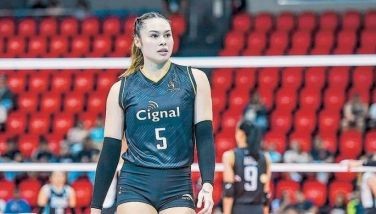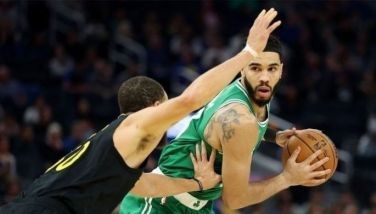Sports in the Sultanate
BANDAR SERI BEGAWAN, Brunei Darussalam – In 30 years of travel as a broadcaster and journalist, this writer had never been to Brunei. Ironically, the sultanate is just a two-hour hop from the Philippines on a ridiculously late night flight, but it may as well have been the moon. There simply has been very little occasion, sports-wise, to cover some major sporting event here. In fact, this writer is here for a project that does not involve sports at all.
The first thing one experiences in a predominantly Muslim country is a difference in the sporting atmosphere. The European and Malaysian influences have tailored sports here into a vastly different tableau than we are used to. It’s easy to get homesick right away when you open the newspapers and turn on the news.
Firstly, there is no news about basketball, unless you go online, the one constant in our universe now. They are crazy about badminton, a sport that, sadly, Filipinos have not truly excelled at. This writer recalled when Weena Lim became the first Philippine athlete, male or female, to qualify for the Olympic Games in 1996. Before she had even been given her ticket to Atlanta, she faced a barrage of criticism because critics were saying that she was ranked too low to be a threat to anybody, and that she was just going to get beaten badly, anyway. Still, that was not the point. Here, badminton is king, and major tournaments are on television with regularity. You could close your eyes and know when it was showing and on what channel when you press the remote control.
Football, naturally, comes second. The European leagues are on the news and in the papers, mostly reaction shots or profile shots of famous players from Europe. Very little news about anything from this part of the globe. This writer started experiencing withdrawal symptoms, and had to check out www.philstar.com to feel connected to our sports universe. It brought back memories of 2011, when I was sent to Bandung, Indonesia, to write about a new martial art that was hastily being lobbied into the Southeast Asian Games, and heard nothing about basketball for four days. It was, in a word, unnerving. Fencing is also quite popular here, and Bruneians contend in Southeast Asia, at least.
Oh, yes, there was a bit of Philippines news. CNN’s Asia bureau had sent a reporter to produce a series of reports out of one stretched-out interview with Manny Pacquiao, a belated effort to ride on his signing the contract to fight Floyd Mayweather. But the reporter sent was obviously out of his depth. Filming at Araneta Coliseum the (again) outdated game between Kia and Talk ‘N Text, the story was mainly about Pacquiao’s basketball career. Luckily, the film crew stumbled upon a banner commemorating the “Thrilla in Manila” 40 years ago to add some context to the piece. In all frankness, it was a disappointing piece with very little by way of substance, but perhaps that’s because we all know Pacquiao’s story backwards and forwards.
But there is fine great glimmer of hope for a sports junkie like myself. Filipinos are everywhere here. They dominate the service industry with their command of English, sense of humor and compassion. And, thrice a week, they indulge their basketball cravings.
I met Enricko Navarro, who was a former San Beda Red Cub and member of the Red Lions “B” team some 13 years ago. I had had occasion to met Eric briefly and cover a couple of his early games. He was all set to join the San Beda team that had broken the 28-year NCAA men’s title drought with Sam Ekwe, when suddenly, another player who had a more influential backer took his slot. A Hotel and Restaurant Management graduate, Navarro initially tried playing in other Southeast Asian countries like Singapore, and found part-time work as a waiter. It was back-breaking, unfulfilling work. Through the course of playing for other commercial teams, he became friends with Michael Garcia, who gained fame as the high-flying “Magic Carpet” of the Laguna Lakers of the defunct Metropolitan Basketball Association. Then he found his way to Brunei, where he now works at the front desk of the Radisson Hotel here.
“There are so many former collegiate players here,” Navarro told this writer. “Once in a while, some retired PBA players come over with movie stars for exhibition games, and they’re paid well. Our reputation as good players has gotten around, so local businesses hire us to reinforce their teams in tournaments like the Sultan’s Cup. But since we all know each other, we never really play that hard against one another.”
One of the referees in the Filipinos’ regular games here is a countryman from La Union who works as a driver for the same hotel. Filipinos are a tight-knit community here, though there are the occasional bad apples who try to put one over even on fellow Filipinos who are tourists.
“Once in a while, we get invited to play in Chinese tournaments in Malaysia and other countries,” says Navarro, who brought his wife and three-year old child here. “You know they don’t stand a chance against us Filipinos, even if they’re taller, especially when it comes to rugged play.”
For the Filipinos here, what they miss most about being home are the sports, entertainment and the nightlife. There’s no real commercial basketball or professional boxing. But it’s part of the price they pay for providing a better future for their families. With no nightlife, most people here save up to travel each month, and Filipinos make short trips back to the motherland. After all, there’s no place like home.
- Latest
- Trending

























